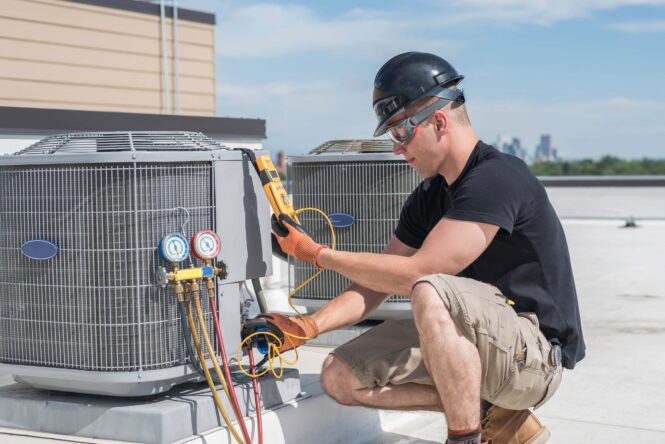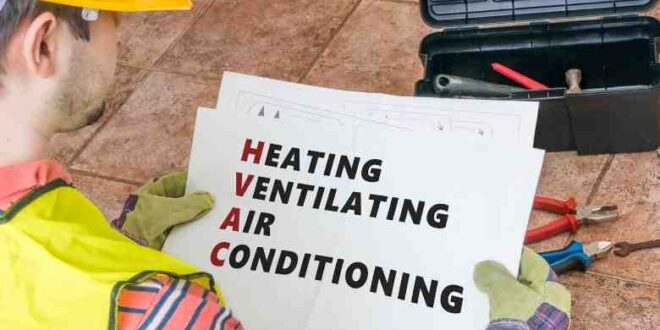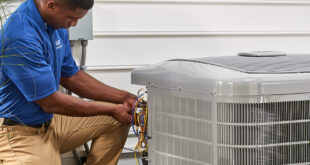The HVAC, plumbing, academic, and wholesaling industries all need HVAC engineers. According to the US Bureau of Labor Statistics, around 90% of HVAC technicians work independently. Specialists in the field set up, service, and repair air conditioners in homes and businesses. If you work in the HVAC industry, you could be able to advance to positions like HVAC Controls Technician or Chief Mechanical Engineer. Since the HVACR business is predicted to grow by 15% through 2026, HVAC engineers have a bright future ahead of them. Much of this expansion in employment is anticipated to be driven by residential and commercial construction activities.
Is working with heating, ventilation, and air conditioning a promising profession? The HVAC industry pays well and has several job openings, so it’s a good choice of career. This line of work has the potential to be highly satisfying while simultaneously resulting in negligible or no debt. If you’re looking for a job that doesn’t require you to be at a computer all day, HVAC may be a good option.
In the HVAC industry, both salaries and the need for fresh talent are on the rise. There may not be enough people to work soon to meet demand. Because of these factors, I advocate for HVAC as a career path for both recent graduates and seasoned workers looking for a change. In sum, working with HVAC systems is a versatile and satisfying profession. If you’re curious as to whether HVAC is challenging, keep reading! As an added bonus, I’ll go into HVAC technician salaries, the profession’s benefits and downsides, and entry requirements.
Should You Work in HVAC? The Pros and Cons

The abbreviation for “heating, ventilation, and air conditioning” is “HVAC.” Therefore, an HVAC technician’s duties include fixing broken equipment and setting up new ones, as well as keeping existing ones in good working order. Examine the pros and cons of a career in HVAC below.
Pros:
Low levels of student loans
Depending on one’s location, the cost of completing either a four-year or a two-year college program can be prohibitive. Trade schools, which provide students with industry-specific training, can be completed in a shorter amount of time and at a lower total cost. Additionally, graduates of trade schools enter the workforce far sooner than those who attend four-year universities. This makes it possible for recently graduated HVAC professionals to enter the workforce and quickly begin recouping the cost of any educational financing they may have incurred.
Possibility of Employment Exists
The complexity of HVAC systems continues to grow. In light of this, the demand for skilled technicians able to maintain, install and diagnose today’s HVAC systems is expected to rise.
Not Possible to Outsource HVAC Work
Work in the HVAC industry is unique in that it cannot be offshored because of the necessity of on-site labor. Service, maintenance, and installation of heating, ventilation, and air conditioning (HVAC) systems are on the job for those who specialize in this field. Due to the sophisticated design of these machines, DIY fixes and routine maintenance are often impossible.
Satisfaction at Work through Promoting Clean Energy
Work productivity is hampered by inefficient HVAC equipment, which must be replaced with a modern, energy-saving alternative. Furthermore, as people become more aware of the benefits of renewable energy, it is opening up exciting new job opportunities in the HVAC industry. Potential careers in the future include energy auditing, green technology consulting, and assessing the efficiency of various types of equipment.
The HVAC industry is a dynamic one, that’s for sure. Training in HVAC is highly recommended for anyone interested in a wide variety of professional paths.
Cons:

Constant Traveling
Working in heating, ventilation, and air conditioning (HVAC) sometimes necessitates going from one place to another to attend to various repairs. Any location, including private residences, businesses, hospitals, factories, and educational institutions, may be the source of an incoming call.
An Uncomfortable Profession
Although most HVAC work is done indoors, servicing heat pumps or other outdoor equipment may be necessary for inclement weather.
As an added challenge, professionals in this field often have to do their duties in confined or uncomfortable settings. Because of faulty air conditioning or heating systems, technicians often have to work in uncomfortable conditions.
Concerns about safety are universal.
Compared to other fields of work, HVAC has a greater rate of injury. In the HVAC industry, workers are always at risk of injuries such as electrical shocks, muscle strains, and burns.
Working with refrigerants also poses a risk of toxic exposure to professionals in this industry. Getting frostbite or losing your sight from coming into contact with a refrigerant is a very real possibility.
Intensive Work Schedule
Most HVAC engineers must put in extra hours during the summer and winter months. Work schedules for HVAC and plumbing technicians employed by contractors are more rigid than for those who are self-employed.
In most cases, those that are mechanically minded, courageous, and full of energy will do best in an HVAC profession. This is due to the inherent dangers of the job, which include long periods of waiting between shifts, working in harsh conditions, and performing strenuous physical tasks.
Salary of an HVAC Technician

To maximize one’s earnings potential in the United Kingdom or the United States, any prospective immigrant should give serious consideration to pursuing a job in the heating, ventilation, and air conditioning industry.
The median annual salary for an HVAC Service Technician in the United States is $44,673, or $20.83 per hour. Technicians with less than a year of experience may expect to earn a median hourly wage of $14.85. It’s common practice to pay $27 per hour to a seasoned professional who has been working in their field for at least twenty years.
The average salary for an HVAC engineer in the US is $66,076. The average salary for a new employee with one year of experience is $55,051. The average salary for an HVAC engineer with 20 years of experience or more is $83,214.
In the UK, an HVAC engineer can expect to earn a median annual salary of £32,104. The average annual salary for an engineer with 1-4 years of experience is £29,492. A professional with 20 years of experience or more can expect an annual salary of around £37.500.
The typical annual income for an HVAC technician in the United Kingdom is £34,641.
 Imagup General Magazine 2024
Imagup General Magazine 2024



